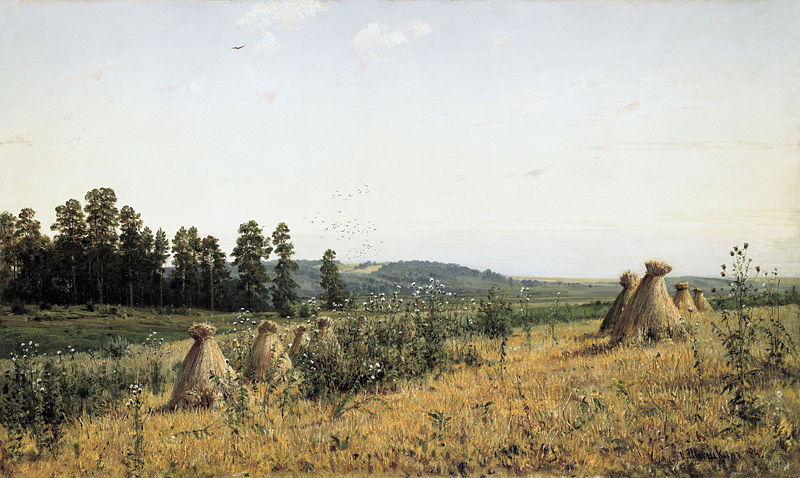My mother Grażyna and her father Stanisław Kalinowski used to sing and liked very much the melody of „Polesia czar” (“The Charm of Polesia”), a song about beauty of Polesia (in Polish: Polesie — the last letter of the region’s name in Polish is ‘e’, despite the fact that we create its genitive case by chaning ‘e’ into ‘a’: Polesie->Polesia, like in the song’s title), a social-cultural region that belongs now to Belarus, Ukraine and Poland, but it used to be whole inside Second Polish Republic when my grandpa had visited Polesie for the first (and the only?) time, in Kamień Koszyrski, with a reunion with family of his sister, Apolonia Hofman. The song “Czas Polesia” with text and melody was written in 1936 or 1939 by Jerzy Artur Kostecki, who comitted a suicide after Soviets invaded Poland on September 17, 1939. The song is about his calf love to a girl that he met in Polesia. And the music is… tango. I was asked by my cousin, Linda, to translate the text into English. My translation is unprofessional (I’m not translator nor poet), but here it comes…
Abstract in Polish / Krótko po polsku:
Moja mama Grażyna i dziadek Stanisław Kalinowski lubili bardzo śpiewać pieśń „Polesia czar”. Zostałem poproszony przez kuzynkę Lindę, abym przetłumaczył jej słowa na angielski, co niniejszym czynię. Gwoli ścisłości, autor utworu zmarł we wrześniu 1939 r., a więc minęło już 70 lat od jego śmierci, mogę więc publikować zarówno cudzy tekst jak i jego własne tłumaczenie. O samej piosence więcej w tygodniku „Niedziela” oraz na blogu artureskiego.
„Polesia czar”
“The Charm of Polesia”
pierwsza zwrotka:
first verse:
Pośród łąk, lasów i wód toni,
Amongst meadows, forests and depths of water,
w ciągłej, pustej życia pogoni
in a continuous, pointless pursuit of life,
żyje posępny lud.
there lives a gloomy folk.
Brzęczą much roje nad bagnami,
Swarms of flies buzz over the swamps,
skrzypi jadący wóz czasami
a cart creaks riding from time to time
poprzez grząską rzekę w bród.
and fording a slushy river.
Czasem ozwie się gdzieś łosia ryk
Sometimes there can be heard a roar of elk
albo w gąszczu dziki głuszca krzyk
or wild shout of woodgrouse in a thicket,
i znów cisza tak niewzruszona,
then again silence so much immovable;
dusza śni pustką rozmarzona
the soul dreams, made languorous by the emptiness,
piękny o Polesiu sen…
a beautiful dream about Polesia…
refren:
refrain:
Polesia czar to dzikie knieje, moczary,
The charm of Polesia are wild forests and marshlands.
Polesia czar smętny to wichrów jęk.
The charm of Polesia is cheerless moaning of the wind.
Gdy w mroczną noc z bagien wstają opary,
While vapours stand up during dark night
serce me drży, dziwny ogarnia lęk
the heart of mine trembles and is overtaken by strange anxiety,
i słyszę, jak w głębi wód jakaś skarga się miota,
so I hear, that in the depth of waters complaint is tossing,
serca prostota wierzy w Polesia cud.
the directness of heart belives in the miracle of Polesia.
druga zwrotka:
second verse:
Tam, gdzie sędziwe szumią lasy,
There, where hoary forests swoosh,
kiedyś ujrzałem pełen krasy
I have seen once the full of beauty
cudny Polesia kwiat.
marvelous bloom of Polesia.
Słonko jaśniejszym mi się zdało,
Sun seemed to me more bright,
wszystko w krąg nas się radowało,
everything around us was glad,
śmiał się do nas cały świat.
the whole world laughed with us
Próżno mi o tobie, dziewczę, śnić,
It has been vainly for me to dream about you, girl,
próżno w żalu i tęsknocie żyć.
vainly to live in sorrow and longing.
Nie wrócą chwile szczęścia niewysłowione,
Moments of inexpressible hapiness won’t return,
drzemią wspomnienia pogrążone
the reminiscences doze deep
w mrokach poleskich kniej.
in the darkness of Polesian forests.
refren:
refrain:
Polesia czar…
The charm of Polesia…
For illustration see a painting “Polesia Landscape” by Ivan Shishkin, 1884 (source: Wikimedia Commons):

Płomień rozgryzie malowane dzieje
Skarby mieczowi spustoszą złodzieje
Pieśń ujdzie cało.
Nieprawda, Ryśie!
Dopoki istnieje polszczyzna wszystko polskie żyje.
„Polesia czar” ma jusz 85 lat (utw. 1927 a.d.), mimo że niema oddawna ani RPII, ani J.A.Kosckiego !